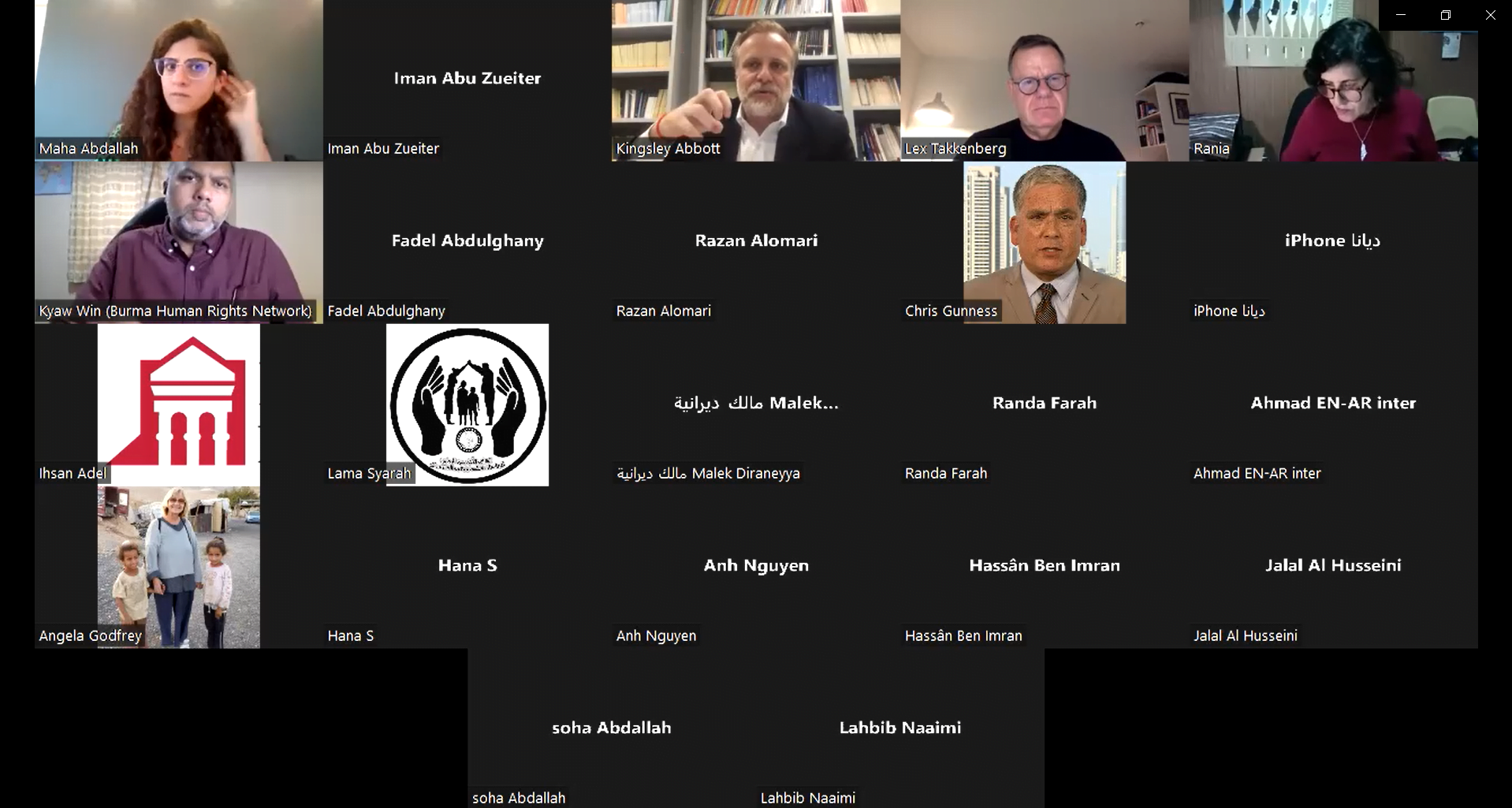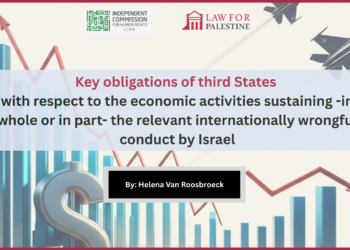Jurists for Palestine Forum discussed the Palestinian Quest for Accountability: What Myanmar and Syria Could Tell Us
Law for Palestine in partnership with the Arab Renaissance for Democracy and Development (ARDD) have organized, as part of the of “Jurists for Palestine Forum” monthly webinars, a webinar titled “The Palestinian Quest for Accountability: What Myanmar and Syria Could Tell Us!”
The webinar, which is the fifth in the second season of the Jurists for Palestine Forum, addressed the mechanisms for international legal accountability utilized by Myanmar and Syria and what light they could shed on how lawyers and activists should proceed in holding Israel accountable for violations against Palestinians.
The webinar was held on September 26th on Zoom and hosted three speakers as well as two commentators. The speakers were Chris Gunnes (founder and director of the Myanmar Accountability Project (MAP) and former UN Director of Strategic Communications and Advocacy in the Middle East), Fadel Abdul Ghany (founder and head of the Syrian Network for Human Rights), and Kingsley Abbott (director of global accountability and international justice at the International Commission of Jurists and former senior legal officer and trial counsel in the Office of the Prosecutor at the UN Special Tribunal for Lebanon.
The commentators were Rania Madi (senior legal advisor at Law for Palestine) and Kyaw Win (found and director of the Burma Human Rights Network (BHRN)). The webinar was moderated by legal researcher and human rights activist Maha Abdallah.
Chris Gunnes: Universal jurisdiction is a powerful tool used for Myanmar that could be used to help Palestinians achieve justice and accountability
During his intervention, Chris Gunnes discussed his work at MAP and how the lessons he learned can be applied to the Palestinian context. MAP is exclusively dedicated to accountability for victims in Myanmar and bringing universal jurisdiction cases for crimes committed by the Junta. The organization engages in not only this kind of legal work but also in public advocacy work.
Applying this kind of model to Palestine would be quite valuable as international legal systems like the ICC are failing to make effective strides toward justice for Palestinians. Looking back at the time he spent at UNWRA, Gunnes explained that he often wonders why people with UNWRA or other branches of the UN are not using the prima facie evidence they are sitting on, such as settlement policies and emails from COGAT about the Gaza blockade, to find a good jurisdiction to pursue a universal jurisdiction case.
Gunnes emphasized that it is important to ignore all the political noise that gets in the way of effective justice for Palestinians. Instead, we need to focus on collecting and documenting evidence, finding a friendly jurisdiction, filing a case there, and using that case as momentum for advocacy efforts.
Fadel Abdel-Ghany: Expectations from the international accountability system must be moderate
On his side, Fadel Abdel-Ghany provided one important lesson to be learnt from the Syrian experience with the international accountability system and the universal jurisdiction: to keep the expectations realistic but without losing interest in the international system nor underestimate its impact.
Abdel-Ghany recalled the two extreme streams dominated the views over international accountability in Syria, both of which were problematic. On one hand, the very optimistic stream raised the victims’ expectations so high that any small achievements were considered worthless. On the other hand, the very pessimistic stream caused losing interest in the international accountability altogether viewing it as useless and waste of time and efforts. This view is also dangerous according to Abdel-ghany since every small achievement is a step closer toward the right direction and it is better than no steps at all, according to him. For instance, in Koblenz case, which sentenced two affiliated to Syrian regime persons, the court clearly acknowledged the crimes against humanity committed by them in Syria. Although the court sentenced individuals rather than the regime, it is still indirectly reminded the world that they are dealing with a barbaric regime. Such decisions have an important impact on blocking any diplomatic relations with the regime, for instance, said Abdelghany.
Kingsley Abbott: We have learned the power of civil society groups and the importance of collecting and documenting evidence on the ground
In his intervention, Kingsley Abbott discussed the different approaches and available initiatives for Palestinians to achieve accountability. International criminal justice is a new and imperfect concept and tool. This newness is a reason for hope because there is so much capacity for finding creative solutions for situations that seem hopeless like was the case in Myanmar. While today we are still combatting impunity for serious human rights violations around the world, there still is reason for hope.
The case of Myanmar is a good example of why we should remain hopeful for achieving justice for Palestine in the future
The case of Myanmar is a good example of why we should remain hopeful for achieving justice for Palestine in the future. In 2016 and 2017, during the earlier stages of violence in Myanmar, we could see the gaps that existed in the international criminal justice system: (1) there were no credible investigations happening, (2) because Myanmar hadn’t ratified the Rome Statute, there was no ICC investigation, (3) the UNSC was so politicized that the Myanmar situation wasn’t referred by them to the ICC, and (4) no universal jurisdiction cases were underway. However, during a short period of time, all this changed. In just a few years an enormous amount of accountability mechanisms were identified around the world and massive strides toward justice were underway.
Today, we are seeing a new generation of UN and non-UN mechanism, such as civil society NGOs and human rights defenders, that are conducting investigations and collecting evidence to use in accountability processes. We are also seeing an increase in usage of universal jurisdiction and in legal innovation in these kinds of cases. From this we have learned the power of civil society groups and lawyers and the importance of collecting and preserving evidence that can later be used in accountability proceedings. We need to keep hope that we will ultimately achieve justice and accountability, while remaining realistic about the time this can take.
It is important to maintain hope and be courageous
The speakers along with the two commentators; Rania Madi and Kyaw Win agreed that there are a lot of reasons to remain hopeful despite all the legal and political setbacks Palestine has experienced. In addition to the recent positive development in international law and universal jurisdiction, there have been many cases including but not limited to Myanmar where documenting evidence has, one day, been massively valuable in achieving accountability. Thus, collecting and documenting evidence of everything is incredibly important right now. We must also try not to get bogged down in the political noise around this and instead focus courageously pursuing the task at hand, one case at a time.
This webinar comes within the monthly activities of the Jurists for Palestine Forum, affiliated to the Law for Palestine Organization. The Forum is holding online monthly webinars gathering international experts and researchers, students, jurists and people interested in Palestine from different countries of the world to discuss topics and developments related to international law and Palestine, in addition to effectively networking between jurists interested in Palestine from all over the world.
** To attend the next monthly webinars of Jurists for Palestine Forum, you can register via the following link here





